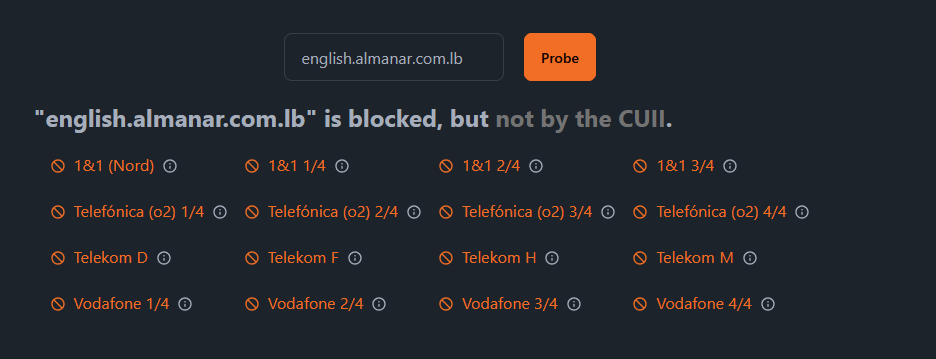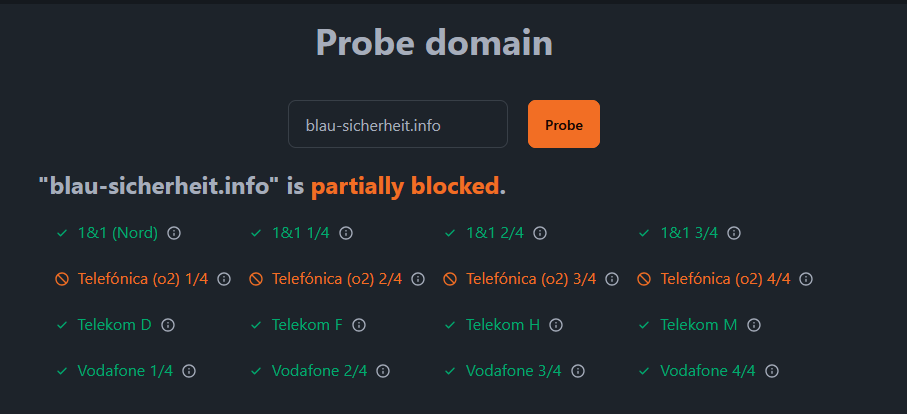German ISP DNS Tampering: Transparency Takes a Backseat
Hello everyone. Let’s talk about Germany’s grand experiment in “Who controls the Internet, anyway?” Spoiler alert: it’s not the judges, it’s not transparent democratic oversight, and it’s sure as hell not you, the paying customer. It’s a cartel of ISPs and copyright lobbyists pulling levers in the background like Bond villains, only without the charisma, competence, or the white fluffy cat. And today’s little scandal should make anyone even remotely interested in digital rights want to slam their keyboard in despair.
The CUII: A Secretive DNS Puppet Master
Germany, in its infinite wisdom, allowed the creation of something called the Clearingstelle Urheberrecht im Internet (CUII) – basically the “Copyright Clearinghouse of the Internet.” Don’t let the bureaucratic name fool you, this is not some impartial body of neutral experts. This is a bunch of ISPs and copyright holders playing ghost jury, deciding which websites should disappear without so much as a courtroom drama. No judge, no warrant, zero transparency. If Kafka designed internet governance with a side of corporate greed, this is what you’d get.
Now, on paper, CUII exists to stop piracy. In practice, it’s basically a Blocklist Club where companies vote themselves new censorship powers and quietly stuff unwanted sites into digital oblivion. Imagine a rogue guild in an MMO that not only decides who enters the raid but also controls whether you’re even allowed to see the dungeon at all. That’s where we are.
DNS Tampering: Because Normal Blocking Wasn’t Sneaky Enough
Here’s how things worked before the ISPs went full cloak-and-dagger. If you queried their DNS server for a blocked domain, you’d get redirected to notice.cuii.info, basically a polite little “You’ve been censored” notice. It was transparent, obvious, and – crucially – easy to track. Our whistleblowing hero here took advantage of that to build a public tool for showing which sites were CUII-blocked. Beautifully simple oversight. Too effective, apparently, because the CUII hated it.

So ISPs like Telekom, Vodafone, and 1&1 decided to swap tactics. Instead of redirecting to notice.cuii.info, they started pretending blocked sites never existed at all. That’s right – not marked, not flagged, just erased from existence. No transparency, no trace, like a bad conspiracy forum mod banning accounts while screaming “What free speech? Nobody banned you.” Telefonica, however, hadn’t “updated” to this new sneaky system yet and still used actual notice redirects… at least until they apparently got spooked by one developer posting transparency reports.
The Blau-Sicherheit Smoking Gun
And here’s where it stops being a boring policy discussion and turns into straight-up tampering sabotage. Telefonica decided to block one of their own domains – blau-sicherheit.info – a domain connected to their own Blau brand. Then, wouldn’t you know it, someone sitting inside Telefonica’s network checked our developer’s site to see if he caught the block. He did. Within two hours, Telefonica mutated its DNS responses to match the others: no more transparency redirect, just full-on domain oblivion. A surgical strike against a watchdog site. It’s the network equivalent of mugging someone in a dark alley while whistling like nothing happened.
- Telefonica blocks its own domain (suspicious) ✅
- Someone at Telefonica checks the watchdog site ✅
- Suddenly DNS system changes in response ✅
If this were a video game raid boss, the mechanic is obvious: it’s testing the player. “Oh, you spotted our weakness mechanic? Too bad, we’re patching it mid-fight.” Only instead of bosses, it’s a cabal of ISPs who think oversight is a security risk, and instead of clever mechanics, it’s sloppy sabotage of transparency tools.
The Fallout: Transparency Nerfed
Without the old notice.cuii.info redirect, the reporting system is harder to maintain. Sure, our watchdog developer came up with workarounds by cross-checking lists of known terrorism-blocks, but that still doesn’t fix the fundamental problem: without transparency, oversight becomes unreliable. And that, my friends, isn’t a bug. That’s a feature – one designed to obscure screwups like the infamous blocking of non-existent domains. Yes, they literally blocked domains that weren’t even online anymore. Efficiency? Not exactly. Embarrassing? Very much so. Which is probably why they decided to stealth-patch their DNS tricks straight afterward.
This isn’t about piracy websites – it’s about ISPs rewriting reality while hiding their mistakes from public view.
The Broader Problem: Corporate Gatekeepers of Truth
This is where the conspiracy theorist in me rubs his hands together. We have private companies – not courts – deciding reality itself. It’s not exaggeration: DNS is literally the internet’s phone book. If they erase your name from the book, boom, you don’t exist. Is it censorship? Is it “security?” Is it some desperate corporate attempt to cover their own incompetence in a fit of quiet editing? Answer: yes, probably all of it.
From a doctor’s perspective, this is basically malpractice. Imagine if a hospital, after botching a surgery, simply erases the patient’s medical record so nobody knows it happened. That’s not “protection.” That’s amnesia as a business model. We wouldn’t accept it in healthcare, so why on Earth should we accept it in our networks?
Conclusion: A Transparent Disaster
Let’s not sugarcoat it: this was sabotage. Telefonica and their co-conspirators didn’t just tweak DNS for fun; they actively tried to undermine a transparency tool. It’s one of those moments where you realize Big Telecom isn’t the friendly service provider handing out Netflix streams but an unaccountable cartel that behaves more like a shadow government of your internet connection.
My verdict? This entire escapade is a steaming pile of anti-consumer nonsense designed to protect corporate asses at the expense of your right to see what’s really happening. Bad, very bad. Like patch 1.0 Diablo III server launch bad.
And that, ladies and gentlemen, is entirely my opinion.
Article source: A German ISP tampered with their DNS – specifically to sabotage my website, https://lina.sh/blog/telefonica-sabotages-me


